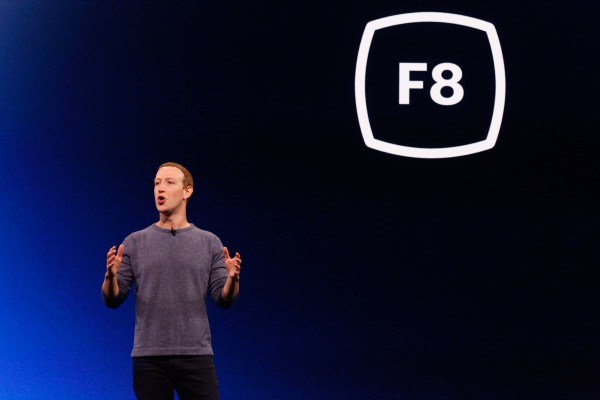Extra Crunch offers members the opportunity to tune into conference calls led and moderated by the TechCrunch writers you read every day. This week, TechCrunch’s Josh Constine and Frederic Lardinois discuss major announcements that came out of Facebook’s F8 conference and dig into how Facebook is trying to redefine itself for the future.
Though touted as a developer-focused conference, Facebook spent much of F8 discussing privacy upgrades, how the company is improving its social impact, and a series of new initiatives on the consumer and enterprise side. Josh and Frederic discuss which announcements seem to make the most strategic sense, and which may create attractive (or unattractive) opportunities for new startups and investment.
“This F8 was aspirational for Facebook. Instead of being about what Facebook is, and accelerating the growth of it, this F8 was about Facebook, and what Facebook wants to be in the future.
That’s not the newsfeed, that’s not pages, that’s not profiles. That’s marketplace, that’s Watch, that’s Groups. With that change, Facebook is finally going to start to decouple itself from the products that have dragged down its brand over the last few years through a series of nonstop scandals.”
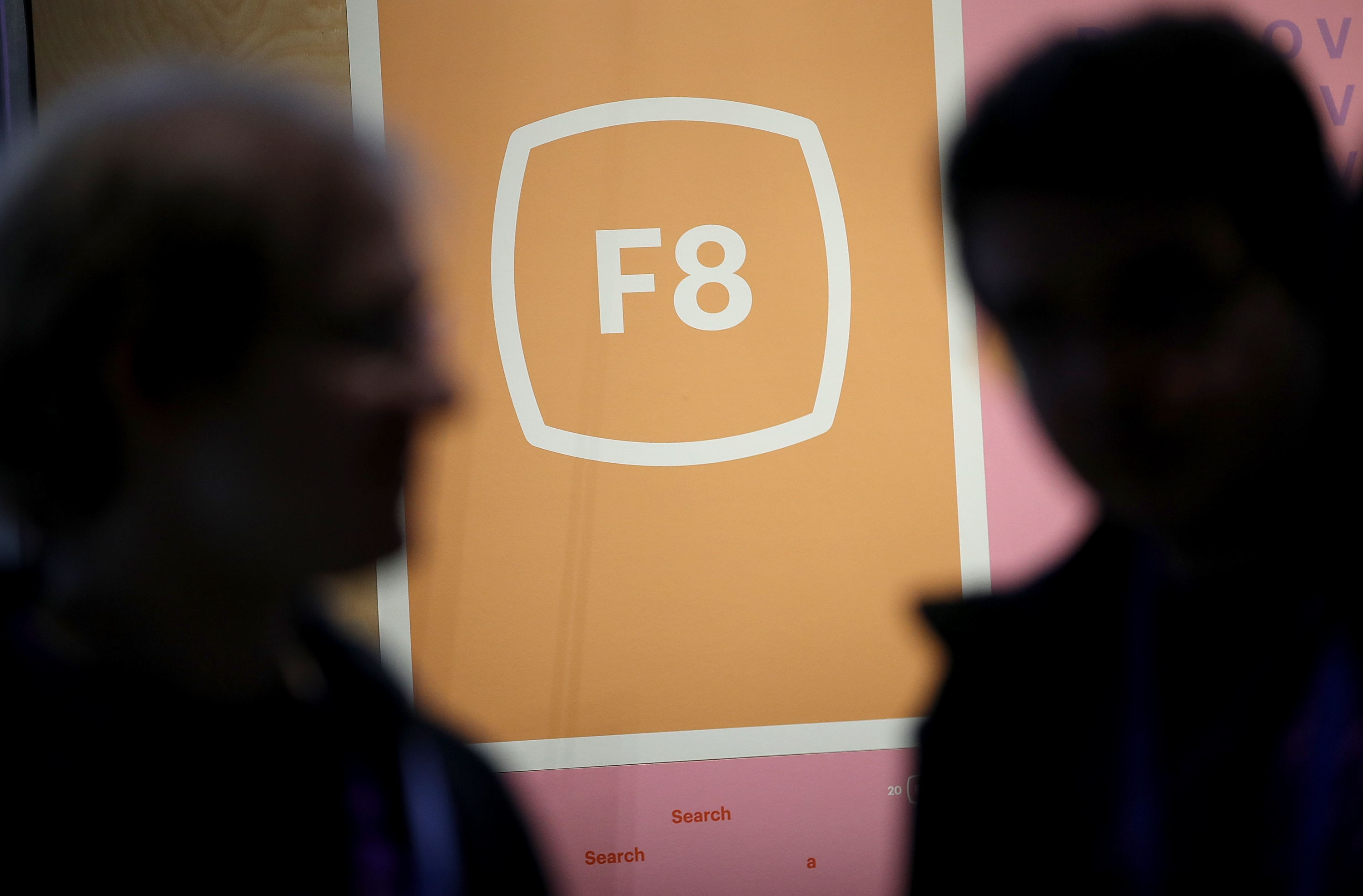
(Photo by Justin Sullivan/Getty Images)
Josh and Frederic dive deeper into Facebook’s plans around its redesign, Messenger, Dating, Marketplace, WhatsApp, VR, smart home hardware and more. The two also dig into the biggest news, or lack thereof, on the developer side, including Facebook’s Ax and BoTorch initiatives.
For access to the full transcription and the call audio, and for the opportunity to participate in future conference calls, become a member of Extra Crunch. Learn more and try it for free.
Josh Constine: Hi, everyone. This is Josh Constine. Editor-At-Large at TechCrunch, and welcome to the F8 Extra Crunch Conference call. We’re really excited to have you guys all on the call with us because this is our opportunity to talk directly with you guys and find out exactly what it is that you need and what we can help with.
We’re here to give you the inside scoop from Facebook’s big conference to find out how you could use that information to improve your business or find new investment opportunities. Let’s jump right in.
Josh: The big message of Facebook’s conference was that it’s trying to become more private. The same thing that Facebook has repeated over and over again. Increasingly, F8 has ceased to be a developer conference as much as it is an opportunity for Facebook to repeat its talking points and try to stress the big message that you should still trust it, and you shouldn’t leave.
It’s become less about Facebook making a ton of progress or building new products which are going to draw in users, as much as it is about fixing the problem that’s already created and keeping hold of that massive 1.59 billion users that visit every single day.
The biggest change that everyone will notice immediately is the massive redesign to the Facebook website, and to its mobile app. It’s much more white and sparse interface is designed to make people feel calm and get rid of that exhausting feeling that you can get from browsing the newsfeed for too long. And a new tab interface puts several of the products that Facebook truly wants to emphasize front and center.
Josh: Facebook has ceased to make F8 about its existing products. We hardly heard anything about the newsfeed where it makes all its money, but where most of the misinformation has come from, or the profile, which it used to tout as this incredible permanent record of everything you’ve done on Facebook, but in the age of SnapChat and Mark Zuckerberg’s recently adopted philosophy espousing ephemerality, that timeline is actually starting to drag down Facebook and make it look like it could be an embarrassment to users.
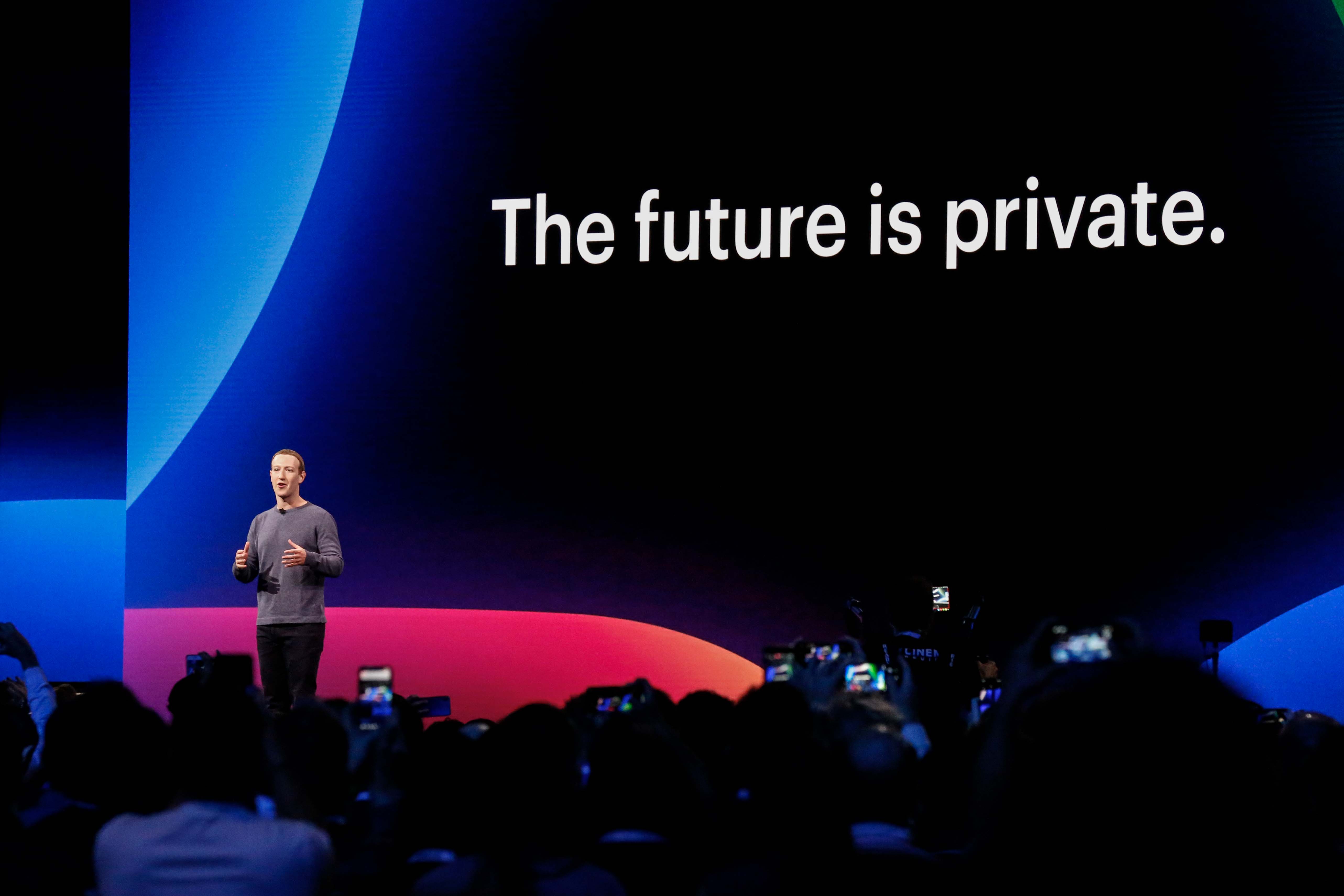
AMY OSBORNE/AFP/Getty Images
We didn’t really hear much about pages, which didn’t make it into the keynote, the same way they’re not really making it into the newsfeed any longer due to so much competition, and Facebook moving away from public content towards friends and family. All of that is still going to be present on Facebook.
The design changes are mostly aesthetic. But there are a few big updates under the hood, and those three big products that I mentioned, Facebook Watch, Facebook Marketplace, and Facebook Groups are where we see real massive opportunities for new investment in startups, and new services in businesses.
Josh: To look at the biggest announcements from the day, I think one of the most interesting items was that Facebook is moving more heavily into dating. Facebook announced that it was getting into dating last year, but now it’s actually going to allow you to say that you have a secret crush on a friend.
Previously, Facebook dating was just about strangers, and that made it more of a competitor with things like Tinder or Bumble, but now that it’s actually opening up to dating with friends, it enters a new market that’s more akin to an old failed app called Bang With Friends, it’s a little bit inappropriate we know, but Facebook has actually seized this huge opportunity that because you might have thousands of friends, you might be more likely to have a great match with somebody you already are friends with, than with a total stranger.
Simultaneously, Facebook is actually going to start getting into the “meet new friend” space. Forever, it has been only been about recreating your offline social network online. But now it actually wants you to expand that offline and online network to new people entirely. That meet new friends product could spell trouble for startups like Hey! VINA, or Bumble, Side App, BFF which are designed to help you meet friends.
And eventually, Facebook could actually turn this into a serious moneymaker, because whenever you have a product where people are trying to get discovered or do networking, there will be people willing to pay to have extra visibility in that product. And so I think that there will be new opportunities here for Facebook, but also decreased opportunities in the dating and meet new friends space. So if you’re considering making an investment in the startup in that area, you might want to think twice.

Josh: Let’s talk a little bit about what’s going on with Instagram. Instagram didn’t have a lot of functional updates yesterday, but what they are doing is significantly cracking down on bullying and the sense of it being a popularity contest. One of the top ways it’s going to do that is by testing hiding like counts on posts, starting in Canada.
This means that when you post something on Instagram, public viewers won’t actually be able to see how many likes it gets. That means you won’t have to worry about comparing your post to influencers, or your friends who might be more popular than you. And you won’t have to worry that, “Oh, I should take down this post because it got an embarrassingly few number of likes.
Josh: This has significant repercussions for the influencer marketing space. Facebook and Instagram say they want to figure out a way to still let influencers communicate their value to potential sponsors. But this does offer new opportunities for startups and services that can do measurement of influencer impact.
Because it’s not going to be as easy to publicly tell how well an influencer is doing, services that provide extra analytics, and metrics, and measurements for brands and sponsors and ways to track that a sponsored post actually gets the reach and has the impact that a brand wants could see a resurgence in value.
Instagram also talked about several new anti-bullying tests. Like an away mode for taking a brief pause without deleting your account, or a nudge feature which will say, “Are you sure you want to post this comment that we think might be hurtful?” What that means is that Instagram is not likely to befall bullying as an existential threat for the long term.
A lot of social networks, if you remember one like Secret, especially apps that are anonymous, can suffer from significant problems because they end up dying because there’s so much hate on the platform and people just get exhausted and don’t want to view that, or be victimized by that anymore.
And the fact that Instagram is taking this very seriously, I think, extends its potential life span, and makes businesses that are built on top of Instagram, whether that’s a direct to consumer product business, an influencer marketing agency, or any brand that’s making its money off of Instagram, I think you will have a longer lifespan, and therefore it’s probably smart to continue investing in audience growth on Instagram.

Josh: Now we can talk a little bit about Oculus. Facebook has finally released an Oculus headset that is easy enough, and fun enough to make a real dent in the adoption of VR.
For years, we’ve seen a massive problem in virtual reality, because either the headsets are extremely powerful but they require a PC, and tons of updates, and ton of hardcore PC user knowledge to get them started, and it can take 10 or 15 minutes just to get into a game making them not very useful, especially if you have kids, or you’re just trying to have a casual VR experience.
Or, they were more like Oculus’ Go headset which it launched last year, which while it’s easy to get started and has no wires and doesn’t require any additional equipment, it’s not actually powerful enough for true immersive experiences that really wow people and say, “It’s worth the money and it’s worth my time.”
But the Oculus Quest, at just $399 without the need for a PC or any wires, and it’s incredible graphics capabilities and immersive inside out tracking, means that people will actually start to use VR a lot more. Facebook tried to jumpstart that by giving away a Quest to every single F8 attendee. I think what we’ll finally start to see is that game developers and experience developers in the virtual reality space will start to have a headset user base large enough to really make money.
And that means that there are new opportunities for investing in immersive in VR content developers. There’s also going to be new opportunities for brand advertising in this space as we start to finally get to wider scale and mainstream adaption.
Oculus also released the Rift S, which is its upgraded version of its wired hardcore strongest headset. This is the one that you have to plug into a PC but you can have an even higher frame rate, better field of view, and just generally even more immersive experience. But it’s just not that much better than the existing Rift headset, and at $50 more at $399, it’s unclear who’s going to want to pick up this headset versus a Quest.
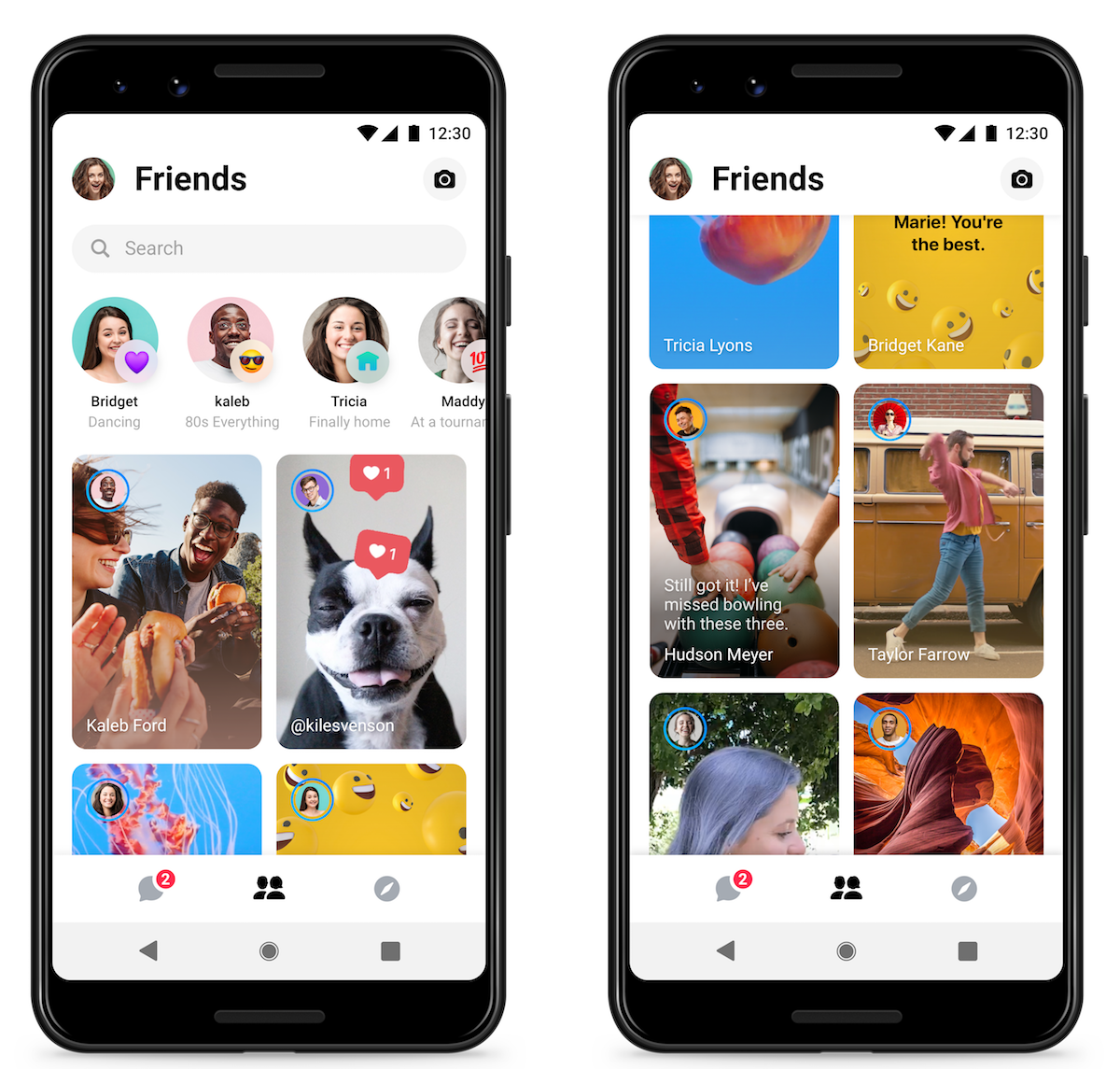
Josh: Now let’s move back to Facebook Messenger. The company made a bunch of updates that are especially important for consumers. It’s going to be adding a desktop app, it’s planning to make its app significantly smaller and much faster, so it loads quicker and it’s better for the developing world.
And it’s launching a co-watching feature that TechCrunch scooped earlier this year, which will let you and your friends simultaneously watch a video while chatting and using video chat interface. And later this year, Facebook Messenger is going to implement a new friend screen which will offer big preview tiles of stories, photos from your chat thread, and most importantly, a new feature called “Your Emoji Status”.
This Emoji Status lets you overlay an emoji over your profile picture, and as well as a small text message to let people know that you have a beer icon, which might be you’re trying to get a drink, or barbell, meaning you’re at the gym, or a home icon, meaning you just finally got back from work.
And these little emblems will help to spur conversations. One of the biggest problems with social networking that nobody has managed to solve yet, and startups like Down To Lunch have at, is that it’s very difficult to tell which of our friends are available for offline hangouts at any given moment.
And if you message a whole bunch of friends saying, “Hey, do you want to get dinner? Do you want to hang out,” and nobody responds or they’re busy, you start to feel really desperate and self-conscious, and you end up just not doing that again in the future.
But by using this emoji status feature, Messenger can become a more popular place for planning offline meetups. That creates opportunities for advertisers, including local businesses that might want to reach users just as they’re making a plan.
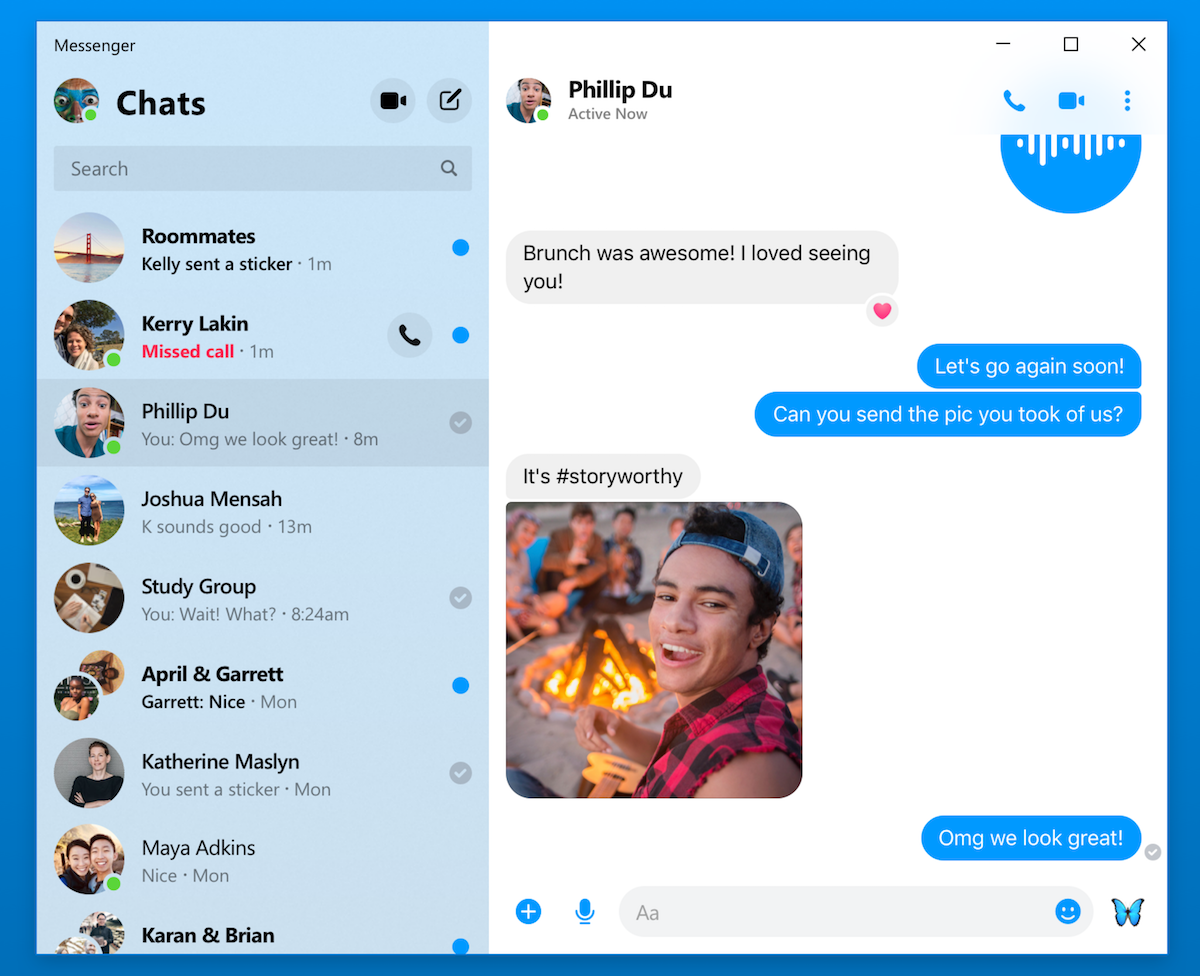
Josh: Meanwhile, that desktop app for Facebook Messenger, could make Messenger a more popular option for customer service and other business activities. Along those lines, Messenger released several new lead generation templates which is basically a chatbot interface for taking in information from a potential sales lead as well as a new appointment booking interface which will allow salons, barbers, dentists, masseuses to book appointments directly through Messenger, instead of having to kick people off to a website.
That really is going to be tough on several of the startups in the space of doing that kind of appointment calendar booking where they equip small businesses with this calendaring system. Because if Messenger can offer this for free in a platform which is already ubiquitous with 1.3 billion users, it’s going to be a lot easier for a business to send people to Messenger than to a proprietary and unfamiliar interface where they might have to set up a whole new account.
Josh: In terms of Facebook Workplace, that’s Facebook’s collaboration software, there wasn’t a ton new there, but it is doing some more algorithmic recommendations. I talked to Julien, the head of Facebook Workplace, yesterday, and I was surprised to find out that Facebook does not plan to become a serious challenger in the enterprise identity space. It’s not going to be challenging Okta or 1Password, which means those startups might have an even brighter future ahead of them.
Because while Facebook is a natural entrant into this space of being the gateway to all your other enterprise apps by creating the login system you used to log into all of those services, it turns out that Facebook wants to partner with services like Microsoft and Okta, rather than steamroll them.
Josh: I think that’s a strategic misstep and a huge opportunity. If Facebook were to buy 1Password or Okta, even for billions of dollars, it could really cement itself in the enterprise space long term. And since it’s not going to be competing there, I think there’s a great opportunity to invest in those spaces or build new ones.
One particularly exciting startup in that space is Rippling from former Zenefits’ co-founder, Parker Conrad, and it uses onboarding and HR as a wedge into that enterprise identity space, which I think will be extremely popular and valuable long term.
It’s another space where I thought Slack would have really gotten into this years ago, and they’ve been a bit too committed to just working on that core chat use case rather than truly becoming the gateway to the rest of the enterprise.
Josh: Facebook will also be getting more heavily into hardware sales, which could affect the greater smart home market. Facebook’s portal device will now go on sale internationally, and it’s going to be adding Amazon Smart Home controls, and Prime Video. It’s also going to start to allow encrypted WhatsApp video calls.
Facebook’s portal device was widely loved by critics and the press, except for one fact, that it was made by Facebook. This company with terrible trust issues and a very poor record of privacy. That means that even if the Portal has the best technology in the market, a lot of users are refusing to buy it.
But if Facebook can continue to tie up closer with Amazon to bring new functionality to Portal, and it can eventually start to break down that toxic brand image that it has, I think Portal can start to be a success.
And I’ve actually really enjoyed using my demo version with my mother back in New York across the country, as we’re able to wear augmented reality mask while we chat, and the smart AI camera follows you around the room so you don’t have to constantly be holding a tablet up in front of your face.

But the fact that the portal didn’t release what I think is the biggest opportunity for Facebook, which is a project that it has codenamed “Ripley”. Ripley is a set-top camera that will turn any television into effectively a Portal, a video chat and internet-connected screen.
I think that’s a huge opportunity for Facebook. It’s very differentiated from the screens offered already by Amazon and Google, and other third-party manufacturers, and it could make use of those giant screens that we often have just sitting in off mode in our homes.
So if you’re trying to figure out how to invest in the smart home market, I think we’re increasingly going to see a few of these core players like Amazon, Google, and Facebook becoming the hub for the rest of these smart home devices rather than dedicated smart home hubs which just controls smart home devices. Instead, people are going to want that media, communication, and smart home control all in one device.
Josh: Now, looking at some of the other big places where Facebook is making new changes, I think the biggest is Facebook Marketplace. Now, previously, Marketplace was really just a Craigslist competitor where with the addition of real-world identity to fight bad behavior, and Facebook’s ubiquity, it became an incredible Craigslist competitor, but it was only for buying and selling stuff in person.
You couldn’t pay for things online and you couldn’t buy things remotely. You had to actually go drive to that person’s house to pick up the item and pay them in cash or Venmo, or what have you. But yesterday, Facebook opened Marketplace and turned it into, what’s effectively a real alternative to Shopify.
Merchants can now accept payments online via Facebook checkout with a credit card that users already have on file, and they can offer to ship items anywhere in the country as long as the buyer agrees to pay. Like I said, that makes Facebook a real Shopify competitor. That could affect Shopify’s long term growth potential, and it could also create new opportunities for services designed to assist merchants in running marketplace stores.
Also, if you’re a direct to consumer business, there is a massive opportunity here, because every time that Facebook releases or emphasizes a new product, it also provides a lot of newsfeed attention and call-outs across its app to visit that feature. That’s basically free promotion.
So if you’re a direct to consumer business or you’re investing in them, I would recommend thinking more about what your Facebook marketplace strategy is early before that space is flooded with competitors.

Josh: One other opportunity I see is in Facebook Watch. Facebook still lacks a tentpole program that is must-see television, that people are going to come to its free ad-supported video streaming service for.
Right now, there’s no such thing as a Facebook Game of Thrones, or House of Cards, or Stranger Things, instead, it’s been spreading its cash rather thinly across a wider array of programs. And that makes sense, given Facebook has this extraordinarily diverse user base across the world.
But we haven’t seen it affect the cultural zeitgeist that all with these mediocre, often reality TV programs, or lower budget scripted programs. I think Facebook really needs to buy a tentpole program which creates an opportunity for production houses and creatives out there to go out and try to sell that program to Facebook instead of Netflix.
Because in Netflix, that content is likely going to be lost amongst all of Netflix’s originals and exclusives which are just constantly churning out. But on Facebook, where it’s desperately in need of that kind of content, it can get real emphasis and featured spotlighting. I think that there are big opportunities for production houses to build big budget content specifically for Watch.
Josh: I want to give you one last idea of a high-level takeaway. This F8 was aspirational for Facebook. Instead of being about what Facebook is, and accelerating the growth of it, this F8 was about Facebook, and what Facebook wants to be in the future.
That’s not the newsfeed, that’s not pages, that’s not profiles, that’s marketplace, that’s Watch, that’s Groups. With that change, Facebook is finally going to start to decouple itself from the products that have dragged down its brand over the last few years through a series of nonstop scandals.
Instead, if they can make you think that Facebook isn’t just about endless scrolling of newsfeed updates of people you don’t care about, and watching mindless viral videos, and click-bait articles, and instead, is about finding a person to date, selling something you don’t need in your home, or buying something you do need.
Being entertained and being able to enjoy that entertainment side by side with your friends even if you’re not together and finding meaningful communities that can replace some of the lost institutions that we see as society secularizes and increasingly communities and neighborhoods and religion, offer fewer opportunities for bonding and that kind of social support.
And so hopefully what this means is that Facebook will actually put the investment into not only changing its philosophy, which we’ve heard nonstop in the everlasting apology tours by Facebook executives, but instead, that it will start to change its product as a way to change its image.

Image via David Paul Morris/Bloomberg via Getty Images
Caller Question: Hi. I was hoping you could talk a little bit about WhatsApp and any changes that are happening there?
Josh: Thanks. WhatsApp didn’t have a ton of announcements made yesterday. One thing that Facebook did stress was that it is building a way for Messenger, Instagram Direct, and WhatsApp to be interoperable. So you’ll be able to message users in between those services.
And that means, tools built for one of those specific platforms like chatbot tools for messenger, or merchant tools from WhatsApp can become a lot more accessible and scalable to a much wider audience so I think there’s an opportunity there.
WhatsApp also started to be integrated with Facebook’s account kit, which means that users will be able to receive login 2-factor authentication code through WhatsApp which could further boost usage there. One thing Facebook didn’t really talk about at F8 but talked about on its recent earnings call is that WhatsApp’s Status now has 500 million daily users on its stories product, known as Status.
That means that while you might know a lot of people using Status, the younger generation, especially in countries where Instagram and SnapChat failed to receive high penetration, are going to be increasingly using a stories product through WhatsApp. That will create new opportunities for advertising as WhatsApp has said that they will be adding more and more ads into Status.
And whenever there’s a new ad platform that people misunderstand, it’s effectively an arbitrage opportunity from businesses who do have the savvy to jump in and receive incredible click-through rates while it still feels novelty users.

Josh: Today on Facebook F8’s second day, we heard a little bit more about some backend tools like Ax, and BoTorch, which we’re hoping people to do experiments on AI, which might seem like a strange way for Facebook to actually hand important technology to its competitors, but that’s likely offset by the recruiting opportunity that Facebook seizes in the engineering world.
When engineers use open source products built by Facebook, it drives their affinity for the company and makes them more likely to want to work there.
Josh: So just a recap. Again, this F8 was about Facebook moving from its old existing product base to this new base that it’s aspirationally hoping to build up. If you want to know what Facebook is going to be, it’s going to be Watch, Marketplace, and Groups, not just newsfeed, pages and profiles.
And now, Frederic Lardinois who is our enterprise and backend engineering expert is going to talk to you guys a little bit about what Facebook said today and what it’s releasing to help developers, and what that could mean for the rest of developer ecosystem.

Frederic Lardinois: Thanks, Josh. To me, and I think for many developers, this year’s F8 was among maybe the most disappointing F8s in many years. Just a few years ago, F8 tended to have a lot of code on stage. Facebook still had Parse, its own developer platform, and that’s gone at this point.
Throughout the keynotes, we heard very, very little about developers. The major announcements that you just mentioned, Ax, and BoTorch, which are two open source tools for improving AI models, were announced in a blog post during the keynote. It did not appear on the big stage at all.
Another update to Pytorch, the main open source deep learning tool from Facebook, which is incredibly popular and gets used by many of its competitors, including Google, and where Facebook works together with Google, did not get any placement at the keynote at all.
So In terms of developer content, F8 really didn’t really offer much. This was very much what you described as a consumer event for the most part. At least on the keynote stage.
Frederic: It seems to reflect a little bit of an identity crisis for Facebook as far as its developer platform goes, because I spent a lot of time sitting there thinking about what are the attendees getting from this? Why are they here? Because the content even in the sessions were not at all that interesting for them.
I think if you come here and you’re a graph QL developer, you didn’t get much. If you’re a React Native developer, which is an incredibly popular tool, which used to be featured very heavily at F8, which is after all a developer conference, didn’t get all that much play at all either. So I wonder a little bit about what Facebook really thinks about F8 going forward.
But, the tools that were announced are really interesting. BoTorch, I think is something we’ll hear quite a lot about because that’s a research platform that I’m sure others will use, and as Josh rightly said in many ways, open source these days is a recruitment platform for these big companies including Facebook.
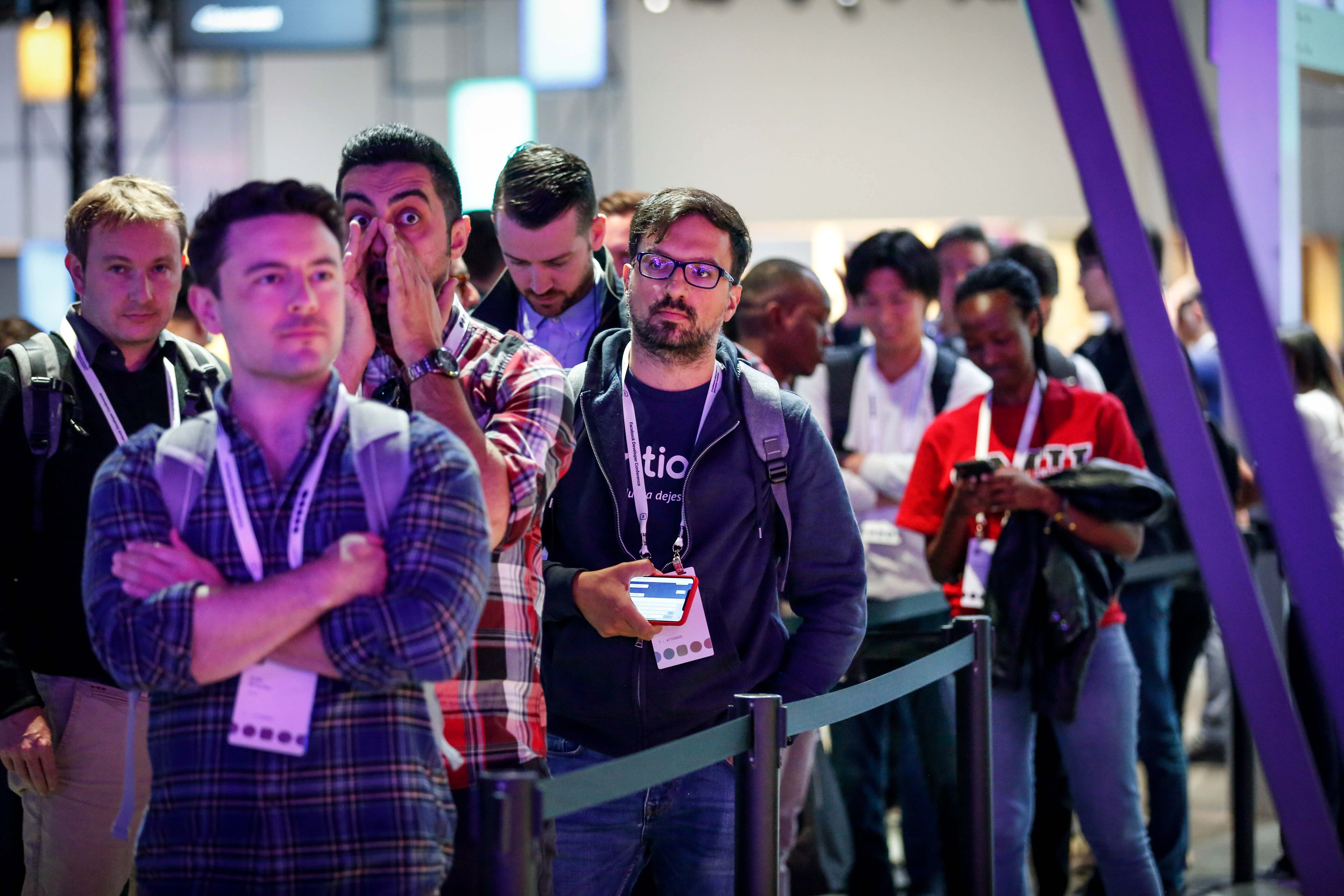
Image via AMY OSBORNE/AFP/Getty Images
Frederic: But at the same time, we’re seeing that Facebook just doesn’t have a developer platform. It doesn’t have a cloud platform the way others have where developers can then use these tools directly. What we saw today in the day two keynote was Facebook talking about how it tackles bias in AI, how it builds machine learning model. What it does to improve the algorithms for detecting hate speech and other malicious content on its site.
Which is great, but developers can’t really take away all that much from that because Facebook operates at a scale that most other developers do not operate at. Most developers do not have a billion users after all. The problems Facebook has to tackle are very different from those that developers have to tackle that are probably here at this event.
I would say what we saw was interesting and there was a couple of updates to the graph API and some things around WhatsApp accounts. But for the most part, this event felt less about developers, as it felt about all the things that Josh just talked about, and about repositioning Facebook consumer company. I think that’s probably my conclusion. That’s what I took away from going to this event.
Josh: Sure, Frederic. And it seems like that’s a sensible strategy given the entire world is still blaming Facebook’s developer platform for interfering with democracy, thanks to Cambridge Analytica. So it’s understandable that Facebook wouldn’t want to trumpet a whole bunch of new ways for developers to access user data.
But if that’s what they build their businesses on, how is it going to retain them in the long term? Because Facebook has always been a delicate, bizarre love quadrangle, as I call it. You have the user who’s really at the center, and they’re the most important part. If Facebook loses them, everything else ceases to matter.
Then it has its advertisers that Facebook has to keep those users around to show and have to keep those advertisers getting the conversion rates and return on investment that they want to continue investing on the platform.
Then, it has the developers, which it has to keep happy so they continue to build experiences that drive lock-in of Facebook, make it a ubiquitous and essential part of internet infrastructure, or where you’re logging in with your Facebook account all around the web, and they build experiences, which cause users to spend more time on Facebook, which helps the company make more money.
Then, the final part of that quadrangle is Facebook itself. It has to prioritize its bottom line, but it thinks very long term about that. It’s willing to take short term hits if it thinks that this is what’s healthiest long term. And we’ve seen over the years, Facebook has made a lot of those hard choices.
Back in early 2010, Facebook’s platform was overrun with game spam due to companies like Zynga. And while it knew it was going to hurt developers, it would benefit users and Facebook in the long term, and so Facebook massively cut down on game spam and virality for those game developers, leading to massive contractions in values, and lots of sell-offs, and startup failures in the Facebook gaming space.
But here we are 10 years later, and Facebook is still thriving, so it was clearly the right move. Now, in the wake of the Cambridge Analytica moment, Facebook has deprecated a lot of potential ability to lock down its platform in a lot of ways, making sure that you can no longer access friend data, and that’s good for users, but that again is problematic for developers. If Facebook doesn’t have the users, there’s no reason to even have a developer platform.

Image via AMY OSBORNE/AFP/Getty Images
Josh: I see this as, being aggravating and disappointing to developers, given Facebook calls this a developer conference and it really isn’t that much anymore. I think long term; it knows that it has to win back user trust before any of them are going to want to spend time on those developers apps.
So first, it has to take care of that user trust. Then it can make sure that it’s still monetizing so it has money to run a developer platform, and then it can use the platform to accelerate its own growth and maximize user engagement.
It’s been really wonderful to talk with you guys, and girls, and ladies and gentlemen. Thank you guys so much for being part of this call and being part of Extra Crunch.
TechCrunch really thrives because of you, our most loyal readers. You’re often our subjects, our sources. You’re the people that really matter to us and we always want to hear more feedback from you.
Feel free to tweet at me, @JoshConstine, or any other TechCrunch accounts and we’ll be happy to take your feedback in reference as we start to evolve Extra Crunch for the future.
Thanks again for reading. If you have anything else, feel free to DM me. Thanks again for joining the F8 Extra Crunch Conference Call.
